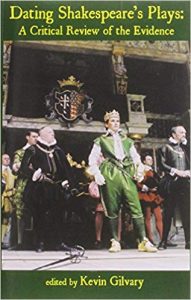The Shakespeare Chronology Recalibrated: Excellent Review by William S. Niederkorn of “Dating Shakespeare’s Plays” Published by the De Vere Society in the U.K.
 Kudos to William Niederkorn for writing an excellent, insightful review of Dating Shakespeare’s Plays. And kudos to editor Kevin Gilvary and the many other contributors to this landmark work. I shouldn’t (and won’t) reprint the entire review here. Several paragraphs follow. To read the entire review, which was published in the April 2011 edition of The Brooklyn Rail, please click on this link now or click on READ MORE at the bottom on this post.
Kudos to William Niederkorn for writing an excellent, insightful review of Dating Shakespeare’s Plays. And kudos to editor Kevin Gilvary and the many other contributors to this landmark work. I shouldn’t (and won’t) reprint the entire review here. Several paragraphs follow. To read the entire review, which was published in the April 2011 edition of The Brooklyn Rail, please click on this link now or click on READ MORE at the bottom on this post.
http://www.brooklynrail.org/2011/04/books/the-shakespeare-chronology-recalibrated
As anybody who has delved into the Shakespeare authorship mystery in any detail knows all too well, the issue of the chronology of the plays is a major point of contention between the orthodox camp and skeptics of various stripes. The traditional Stratfordian chronology has always struck doubters as more or less arbitrary, arranged to neatly fit into the lifespan and presumed career of the Stratfordian Candidate — one William of Stratford. Dating Shakespeare’s Plays tackles this vexing issue with a great deal of skill and refreshing even-handedness. As Niederkorn puts it in his review: “[R]egardless of one’s position on the authorship question, Dating Shakespeare’s Plays is a most informative and useful book on a subject at the center of the Shakespeare labyrinth. It is not the last word, but rather an advantageous starting point.”
I couldn’t agree more. Niederkorn’s review is highly recommended reading … as is Dating Shakespeare’s Plays itself.
Matthew Cossolotto
The Shakespeare Chronology Recalibrated
by William S. Niederkorn
Dating Shakespeare’s Plays: A Critical Review of the Evidence
edited by Kevin Gilvary
(Parapress, 2010)
Determining the chronology of Shakespeare’s plays has been both central and problematic since Shakespeare studies originated in the 18th century. Edmond Malone, whose work is regarded as the cornerstone of Shakespeare scholarship, made the first serious attempt. Malone’s initial Shakespeare achievement was his essay An Attempt to Ascertain the Order in which the Plays attributed to Shakespeare were written, included in the second edition of the Johnson-Steevens Shakespeare in 1778. This was “pioneering research,” as Peter Martin called it in his 1995 biography.
In 1875, Edward Dowden, in his Shakespeare: A Critical Study of his Mind and Art, divided Shakespeare’s career into four periods, based on what he deemed appropriate to the playwright’s age and mood, a division that Shakespeare academics still widely affirm. Dowden vastly expanded on Malone’s use of stylistic data, like frequency of rhyme, to support his chronology with statistics.
E. K. Chambers thoroughly reviewed the full scope of dating research in his William Shakespeare: A Study of Facts and Problems, published in 1930, and laid out a chronology derived largely from Malone and Dowden. Of the 36 plays in the First Folio, Chambers’s dating exactly matches Malone’s on 14 plays and deviates from it by only one year on eight more.
Then, in 1987, came William Shakespeare: A Textual Companion by Stanley Wells and Gary Taylor. Though Wells and Taylor admitted, “The existing or ‘orthodox’ chronology for all Shakespeare’s plays is conjectural,” their dates match Dowden and Chambers exactly for 24 plays and differ on average by less than two years for the rest.
All of this is recounted in the introduction to Dating Shakespeare’s Plays: A Critical Review of the Evidence. This new book, apparently several years in the making, goes on to review other aspects of the inherited tradition, and then lays out, play by play, the evidence put forward by scholars who believe that the plays were written by William Shakespeare of Stratford, followed by the evidence put forward by scholars who believe they are by Edward de Vere, the 17th Earl of Oxford.
The book is a major comprehensive revision and re-envisioning of the Shakespeare chronology, but it does not set up a rigid chronology of its own. The new chronology is refreshingly diverse, like the world of Shakespeare authorship studies.
The main challenge to the Shakespeare orthodoxy for much of the past century has been Oxfordian, though Oxfordians, unlike Stratfordians, have made the effort inclusive and welcome into their conferences and journals advocates for Bacon, Marlowe, William Stanley, Edward Dyer, Mary Sidney, et al., including, of course, Stratfordians. As a result, a more open-minded approach to Shakespeare is developing outside the mainstream.
Membership dues cover only a fraction of our budget, including all our research, preservation and programming. Please support the SOF by making a gift today!
Blue Boar Tavern: Wassail Q&A
Tuesday Dec. 17, 8pm E / 5pm P
Sign up below for event invites!
